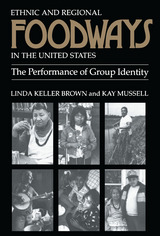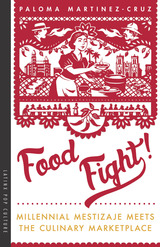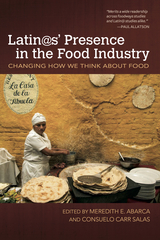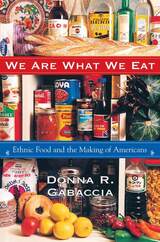
—Joanne Wagner, Anthropological Quarterly
How do customs surrounding the preparation and consumption of food define minorities within a population? The question receives fascinating and multifaceted answers in this book, which considers a smorgasbord of dishes that sustain group identity and often help to bridge inter-group barriers.
The essays explore the symbolic meaning of shared foodways in interpreting inter- and intra-group behavior, with attention to theoretical problems and the implications of foodways research for public policy. Topics receiving rewarding analysis in this volume include food festivals, modes of food preparation, meal cycles, seasonal celebrations, nutrition education, and the government's inattention to ethnic customs in forumlating its food policies.

In Food Fight! author Paloma Martinez-Cruz takes us on a Chicanx gastronomic journey that is powerful and humorous. Martinez-Cruz tackles head on the real-world politics of food production from the exploitation of farmworkers to the appropriation of Latinx bodies and culture, and takes us right into transformative eateries that offer a homegrown, mestiza consciousness.
The hard-hitting essays in Food Fight! bring a mestiza critique to today’s pressing discussions of labeling, identity, and imaging in marketing and dining. Not just about food, restaurants, and coffee, this volume employs a decolonial approach and engaging voice to interrogate ways that mestizo, Indigenous, and Latinx peoples are objectified in mainstream ideology and imaginary.

Latin@s’ Presence in the Food Industry takes the holistic culinary approach of bringing together multidisciplinary criticism to explore the diverse, and not always readily apparent, ways that Latin@s relate to food and the food industry.
The networks Latin@s create, the types of identities they fashion through food, and their relationship to the US food industry are analyzed to understand Latin@s as active creators of food-based communities, as distinctive cultural representations, and as professionals. This vibrant new collection acknowledges issues of labor conditions, economic politics, and immigration laws—structural vulnerabilities that certainly cannot be ignored—and strives to understand more fully the active and conscious ways that Latina@s create spaces to maneuver global and local food systems.

Ghulam Bombaywala sells bagels in Houston. Demetrios dishes up pizza in Connecticut. The Wangs serve tacos in Los Angeles. How ethnicity has influenced American eating habits—and thus, the make-up and direction of the American cultural mainstream—is the story told in We Are What We Eat. It is a complex tale of ethnic mingling and borrowing, of entrepreneurship and connoisseurship, of food as a social and political symbol and weapon—and a thoroughly entertaining history of our culinary tradition of multiculturalism.
The story of successive generations of Americans experimenting with their new neighbors’ foods highlights the marketplace as an important arena for defining and expressing ethnic identities and relationships. We Are What We Eat follows the fortunes of dozens of enterprising immigrant cooks and grocers, street hawkers and restaurateurs who have cultivated and changed the tastes of native-born Americans from the seventeenth century to the present. It also tells of the mass corporate production of foods like spaghetti, bagels, corn chips, and salsa, obliterating their ethnic identities. The book draws a surprisingly peaceful picture of American ethnic relations, in which “Americanized” foods like Spaghetti-Os happily coexist with painstakingly pure ethnic dishes and creative hybrids.
Donna Gabaccia invites us to consider: If we are what we eat, who are we? Americans’ multi-ethnic eating is a constant reminder of how widespread, and mutually enjoyable, ethnic interaction has sometimes been in the United States. Amid our wrangling over immigration and tribal differences, it reveals that on a basic level, in the way we sustain life and seek pleasure, we are all multicultural.
READERS
Browse our collection.
PUBLISHERS
See BiblioVault's publisher services.
STUDENT SERVICES
Files for college accessibility offices.
UChicago Accessibility Resources
home | accessibility | search | about | contact us
BiblioVault ® 2001 - 2024
The University of Chicago Press









